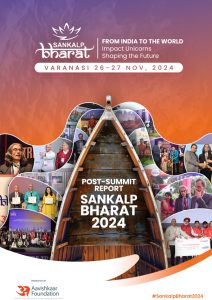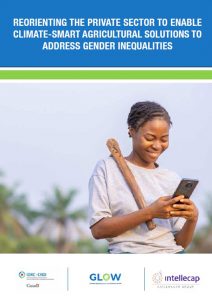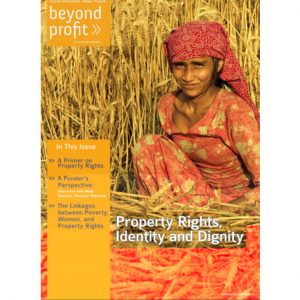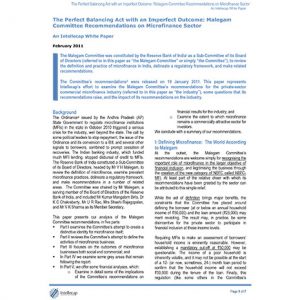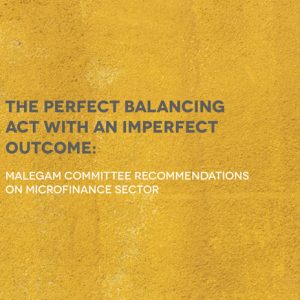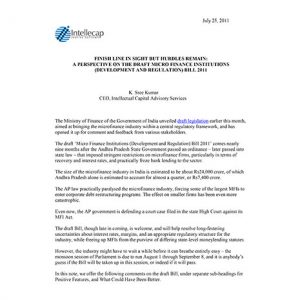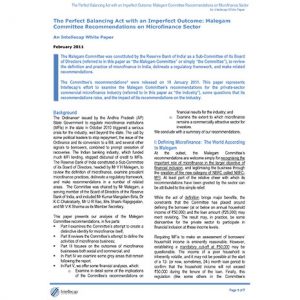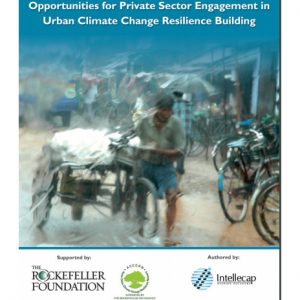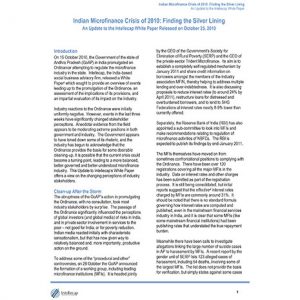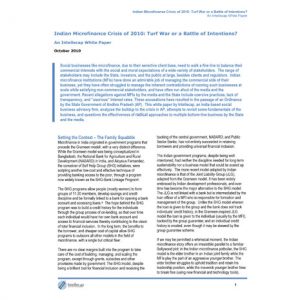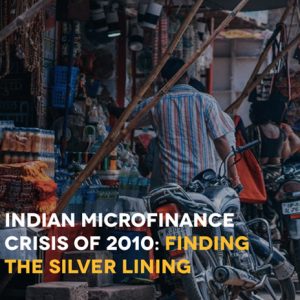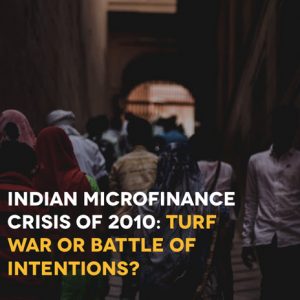TRENDING
-
SSAGA – Benefitting small-scale farmers by fostering innovations and collaboration across the Global South
Published: March, 2025 -
Sankalp Bharat 2024-Post Summit Report
Published: March, 2025 -
Reorienting The Private Sector To Enable Climate-smart Agricultural Solutions To Address Gender Inequalities
Published: February, 2025
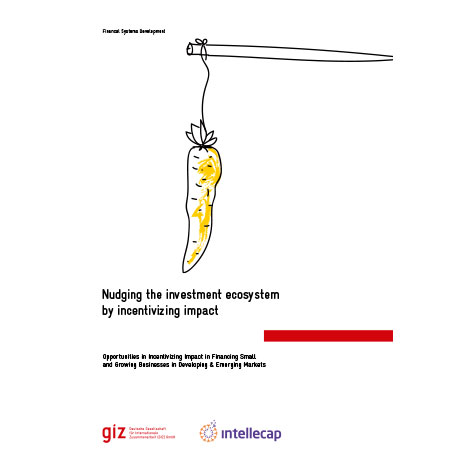
Nudging The Investment Ecosystem By Incentivizing Impact
PUBLISHED: June, 2018
Opportunities in Incentivizing Impact in Financing Small and Growing Businesses in Developing & Emerging Markets
This paper is a summary of fresh ideas on how to channel more capital into impact investing and incentivize impact creation. Building on insights generated by experts at the BMZ hosted conference Financing Global Development – Leveraging Impact Investing for the SDGs, the paper furthers the conversation on Impact Measurement and Management, IMM 2.0, through brainstorming practical ideas and viewpoints in the impact investing value chain: those who provide capital, those who manage it, and those who receive it. This included close to 50 stakeholders, including fund managers, DFIs, intermediaries, entrepreneurs, governments, CSOs and others.
The discussion, conducted in the form of a ‘design lab’ by Deutsche Gesellschaft für Internationale Zusammenarbeit (GIZ) GmbH, Intellecap, and the Swiss Agency for Development and Cooperation (SDC), aims to start a conversation on how to maximize impact by channeling capital into small and growing businesses (SGBs) as a way to expedite achievement of SDGs (Sustainable Development Goals). During the session, industry leaders like FMO, Vox Capital, and Roots of Impact had shared case studies of good practices in incentivizing impact along the investment chain. This formed the basis of brainstorming on development of new ideas on innovative instruments that could nudge the ecosystem towards more actively pursuing and scaling impact.
The result is an analysis of the barriers in the impact investment value chain highlighted during the stakeholder conversations, and key insights on how to overcome them (for example, the need for transparency, standardization, leadership, etc.). In addition, the workshop collated a list of potential ‘wild ideas’ to like impact currency, impact rewards, impact index, online market places for impact auctioning, and a give-back distribution impact support system, designed to incentivize increased levels of investment along the value chain. The practical approaches suggested by stakeholders fit well with the existing impact measurement and monitoring frameworks like GIIN’s IRIS and Intellecap’s PRISM and hold the potential to guide impact capital more efficiently by leveraging good practices.

The Financial Lives of Government Employees – Potential of Digital Finance in Sierra Leone
PUBLISHED: July, 2018
This report documents findings from research on the financial lives of government employees in Sierra Leone, commissioned by the Government to People Payments Project – Building Digital Ecosystem funded by USAID. Intellecap supported UNCDF, Government of Sierra Leone and Bank of Sierra Leone for conducting the research.
There are 80,000 government employees in Sierra Leone who receive salaries digitally in their bank accounts. Insights about their financial lives can help build a viable business case for DFS to expand access to a wide range of financial services for underserved communities in Sierra Leone. Such insights can inform strategies and use cases that the UNCDF and the Government of Sierra Leone can develop to promote DFS in the country. The National Strategy for Financial Inclusion 2017 – 2020 also refers to the need to identify and digitize use cases that will lead to habitual usage, and achieve Sierra Leone’s commitments to the ‘Better Than Cash Alliance’.
Recognizing the need and opportunity, UNCDF supported the Financial Lives Survey of government employees who receive their salaries digitally in Sierra Leone. Intellecap designed the survey to understand how government employees utilize salaries transferred into their bank accounts, their awareness of and access to DFS, avenues to use them and their perceptions about financial services and digital financial transactions. This report contains insights from the survey about potential customers of DFS and recommendations on use cases that could be piloted as an initial step to improve DFS adoption in Sierra Leone.
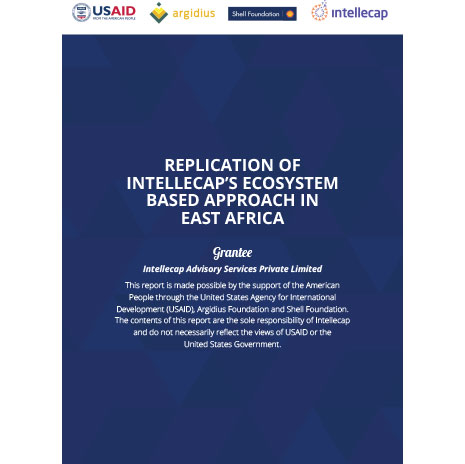
Replication of Intellecap’s Ecosystem Based Approach in East Africa
PUBLISHED: July, 2018
Intellecap has sought to replicate its ecosystem-based approach to East Africa by bringing
together capital, knowledge and networks to support SGBs at two levels: (i) provide direct support
to SGBs in the form of acceleration, fund-raising, technical assistance, innovation transfer, and
market linkages, and (ii) discover and engage critical ecosystem players such as corporations
(both local and international), accelerators, other development sector players in supporting SGBs.
In the three-year period since the launch of our initiative to replicate our ecosystem-based
approach for accelerating entrepreneurship support to SGBs in East Africa, we have received
generous support not only from our funders, but also from a number of local and international stakeholders such as development institutions, private sector entities, and industry associations.
Over the last year, we have replicated our advocacy platform (Sankalp), angel investment network
(I3N) advisory services (consulting & investment banking), virtual incubation platform
(StartupWave) and impact measurement platform (PRISM) as envisaged at the beginning of our
programmatic support. The development and adaptation of StartupWave for East Africa has
resulted in over 450 sign-ups for our early stage enterprise support activities and partnerships with
over 30 incubators / accelerators. Similarly, PRISM, our impact measurement platform, has
garnered interest from a wide variety of players to measure the impact of their programs.
All Publications
-
Beyond Profit Special Issue: Property Rights, Identity and Dignity
PUBLISHED: March, 2011Tags: Financial ServicesRegion: AsiaREAD MORE -
The Perfect Balancing Act with an Imperfect Outcome: Malegam Committee Recommendations on Microfinance Sector
PUBLISHED: February, 2011READ MORE -
The Perfect Balancing Act with an Imperfect Outcome: Malegam Committee Recommendations on Microfinance Sector
PUBLISHED: February, 2011Tags: Financial ServicesRegion: AsiaREAD MORE -
Finish Line in Sight But Hurdles Remain: A Perspective on the Draft Micro Finance Nstitutions (Development and Regulation) Bill 2011
PUBLISHED: January, 2011READ MORE -
The Perfect Balancing Act with an Imperfect Outcome: Malegam Committee Recommendations on Microfinance Sector
PUBLISHED: January, 2011READ MORE -
Opportunities for Private Sector Engagement in Urban Climate Change Resilience Building
PUBLISHED: December, 2010Tags: EnergyRegion: AsiaREAD MORE -
Indian Microfinance Crisis of 2010: Finding the Silver Lining An Update to the Intellecap White Paper Released on October 25, 2010
PUBLISHED: October, 2010READ MORE -
Indian Microfinance Crisis of 2010: Turf War or a Battle of Intentions? An Intellecap White Paper
PUBLISHED: October, 2010READ MORE -
Indian Microfinance Crisis of 2010: Finding the Silver Lining
PUBLISHED: October, 2010Tags: Financial ServicesRegion: AsiaREAD MORE -
Indian Microfinance Crisis of 2010: Turf War or a Battle of Intentions?
PUBLISHED: October, 2010Tags: Financial ServicesRegion: AsiaREAD MORE
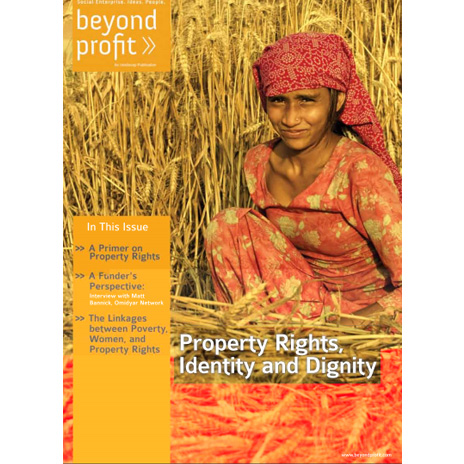
Beyond Profit Special Issue: Property Rights, Identity and Dignity
PUBLISHED: March, 2011
Beyond Profit was a social enterprise magazine launched by Intellecap in 2009 to present the stories, people and ideas behind innovative social enterprises. It brought together first-hand insights and expert commentary across Intellecap’s Focus Sectors and related themes.
This special issue of Beyond Profit looks into “property rights” – an important, but often overlooked, aspect of poverty alleviation. Tackling the problem of how to improve access to and implementation of property rights poses real challenges to policy-makers and development practitioners because of the complexity of the issue and its controversial nature.
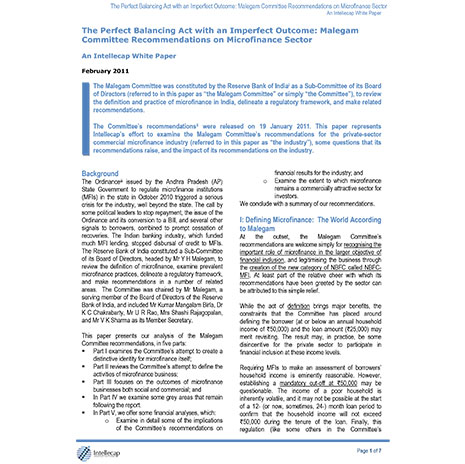
The Perfect Balancing Act with an Imperfect Outcome: Malegam Committee Recommendations on Microfinance Sector
PUBLISHED: February, 2011
The Malegam Committee was constituted by the Reserve Bank of India’ as a Sub-Committee of its Board of Directors (referred to in this paper as “the Malegam Committee” or simply “the Committee”), to review the definition and practice of microfinance in India, delineate a regulatory framework, and make related recommendations.
The Committee’s recommendations” were released on 19 January 2011. This paper represents Intellecap’s effort to examine the Malegam Committee’s recommendations for the private-sector commercial microfinance industry (referred to in this paper as “the industry”), some questions that its recommendations raise, and the impact of its recommendations on the industry.
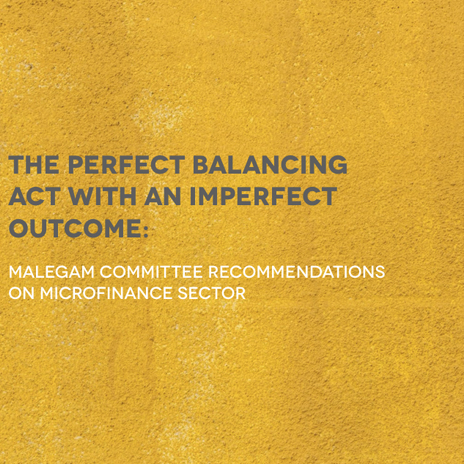
The Perfect Balancing Act with an Imperfect Outcome: Malegam Committee Recommendations on Microfinance Sector
PUBLISHED: February, 2011
In the fall of 2010, a microfinance crisis started in the southern Indian state of Andhra Pradesh, and had implications for the industry nationwide. One of these had been the recommendations put forth to the Reserve Bank of India (RBI) by the Malegam Committee. Intellecap released a white paper responding to these recommendations.
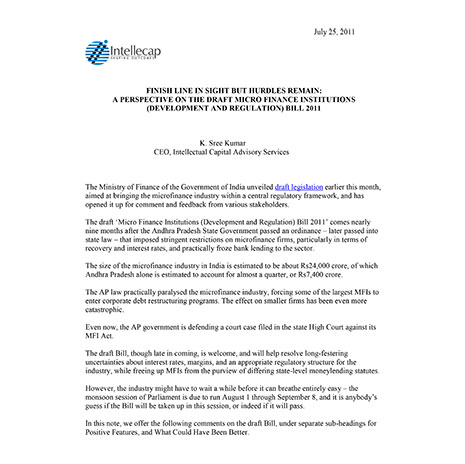
Finish Line in Sight But Hurdles Remain: A Perspective on the Draft Micro Finance Nstitutions (Development and Regulation) Bill 2011
PUBLISHED: January, 2011
The Ministry of Finance of the Government of India unveiled draft legislation earlier this month, aimed at bringing the microfinance industry within a central regulatory framework, and has opened it up for comment and feedback from various stakeholders.
The draft „Micro Finance Institutions (Development and Regulation) Bill 2011‟ comes nearly nine months after the Andhra Pradesh State Government passed an ordinance – later passed into state law – that imposed stringent restrictions on microfinance firms, particularly in terms of recovery and interest rates, and practically froze bank lending to the sector.
The size of the microfinance industry in India is estimated to be about Rs24,000 crore, of which Andhra Pradesh alone is estimated to account for almost a quarter, or Rs7,400 crore.
The AP law practically paralysed the microfinance industry, forcing some of the largest MFIs to enter corporate debt restructuring programs. The effect on smaller firms has been even more catastrophic.
Even now, the AP government is defending a court case filed in the state High Court against its MFI Act.
The draft Bill, though late in coming, is welcome, and will help resolve long-festering uncertainties about interest rates, margins, and an appropriate regulatory structure for the industry, while freeing up MFIs from the purview of differing state-level moneylending statutes.
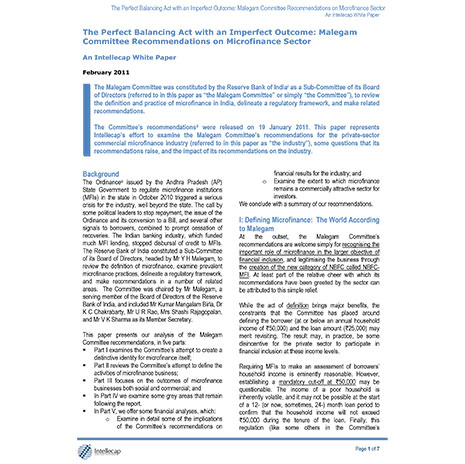
The Perfect Balancing Act with an Imperfect Outcome: Malegam Committee Recommendations on Microfinance Sector
PUBLISHED: January, 2011
The Malegam Committee was constituted by the Reserve Bank of India’ as a Sub-Committee of its Board of Directors (referred to in this paper as “the Malegam Committee” or simply “the Committee”), to review the definition and practice of microfinance in India, delineate a regulatory framework, and make related recommendations.
The Committee’s recommendations” were released on 19 January 2011. This paper represents Intellecap’s effort to examine the Malegam Committee’s recommendations for the private-sector commercial microfinance industry (referred to in this paper as “the industry”), some questions that its recommendations raise, and the impact of its recommendations on the industry.

Opportunities for Private Sector Engagement in Urban Climate Change Resilience Building
PUBLISHED: December, 2010
Asian cities are especially susceptible to unpredictable environmental change, as these cities are expected to account for more than 60 percent of global population growth in the next 30 years.
Measures that help the urban poor in Asian cities adapt to the changing climate and build their resilience and capacity to respond dynamically to its adverse impacts, are essential, and call for attention, funding and action from civil society, the public and private sectors. Private sector engagement in Urban Climate Change Resilience Building (UCCRB) is particularly important, as the need is vast, and grant funding from governments and donors is limited.
This new report, supported by the Rockefeller Foundation, aims to identify business opportunities in UCCRB, and to understand the drivers and inhibitors to private sector participation.
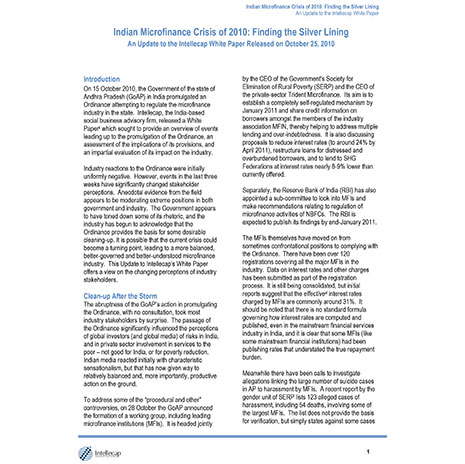
Indian Microfinance Crisis of 2010: Finding the Silver Lining An Update to the Intellecap White Paper Released on October 25, 2010
PUBLISHED: October, 2010
On 15 October 2010, the Government of the state of Andhra Pradesh (GoAP) in India promulgated an Ordinancei attempting to regulate the microfinance industry in the state. Intellecap, the India-based social business advisory firm, released a White Paperii which sought to provide an overview of events leading up to the promulgation of the Ordinance, an assessment of the implications of its provisions, and an impartial evaluation of its impact on the industry.
Industry reactions to the Ordinance were initially uniformly negative. However, events in the last three weeks have significantly changed stakeholder perceptions. Anecdotal evidence from the field appears to be moderating extreme positions in both government and industry. The Government appears to have toned down some of its rhetoric, and the industry has begun to acknowledge that the Ordinance provides the basis for some desirable cleaning-up. It is possible that the current crisis could become a turning point, leading to a more balanced, better-governed and better-understood microfinance industry. This Update to Intellecap‟s White Paper offers a view on the changing perceptions of industry stakeholders.
Clean-up After the Storm
The abruptness of the GoAP‟s action in promulgating the Ordinance, with no consultation, took most industry stakeholders by surprise. The passage of the Ordinance significantly influenced the perceptions of global investors (and global media) of risks in India, and in private sector involvement in services to the poor – not good for India, or for poverty reduction. Indian media reacted initially with characteristic sensationalism, but that has now given way to relatively balanced and, more importantly, productive action on the ground.
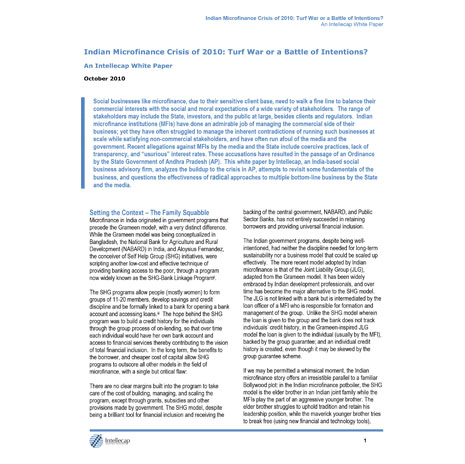
Indian Microfinance Crisis of 2010: Turf War or a Battle of Intentions? An Intellecap White Paper
PUBLISHED: October, 2010
Social businesses like microfinance, due to their sensitive client base, need to walk a fine line to balance their
commercial interests with the social and moral expectations of a wide variety of stakeholders. The range of
stakeholders may include the State, investors, and the public at large, besides clients and regulators. Indian
microfinance institutions (MFIs) have done an admirable job of managing the commercial side of their
business; yet they have often struggled to manage the inherent contradictions of running such businesses at
scale while satisfying non-commercial stakeholders, and have often run afoul of the media and the
government. Recent allegations against MFIs by the media and the State include coercive practices, lack of
transparency, and “usurious” interest rates. These accusations have resulted in the passage of an Ordinance
by the State Government of Andhra Pradesh (AP). This white paper by Intellecap, an India-based social
business advisory firm, analyzes the buildup to the crisis in AP, attempts to revisit some fundamentals of the
business, and questions the effectiveness of radical approaches to multiple bottom-line business by the State
and the media.
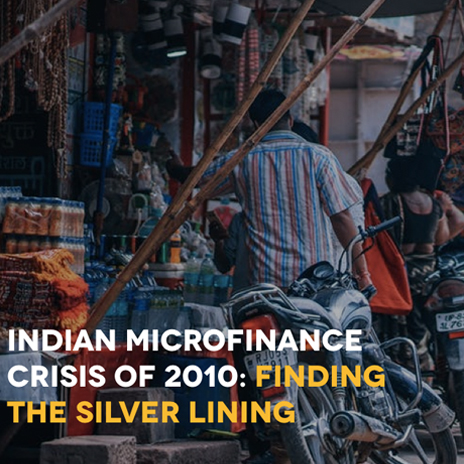
Indian Microfinance Crisis of 2010: Finding the Silver Lining
PUBLISHED: October, 2010
On 15 October 2010, the Government of the state of
Andhra Pradesh (GoAP) in India promulgated an
Ordinancei attempting to regulate the microfinance
industry in the state. Intellecap, the India-based
social business advisory firm, released a White
Paperii which sought to provide an overview of events
leading up to the promulgation of the Ordinance, an
assessment of the implications of its provisions, and
an impartial evaluation of its impact on the industry.
Industry reactions to the Ordinance were initially
uniformly negative. However, events in the last three
weeks have significantly changed stakeholder
perceptions. Anecdotal evidence from the field
appears to be moderating extreme positions in both
government and industry. The Government appears
to have toned down some of its rhetoric, and the
industry has begun to acknowledge that the
Ordinance provides the basis for some desirable
cleaning-up. It is possible that the current crisis could
become a turning point, leading to a more balanced,
better-governed and better-understood microfinance
industry. This Update to Intellecap‟s White Paper
offers a view on the changing perceptions of industry
stakeholders
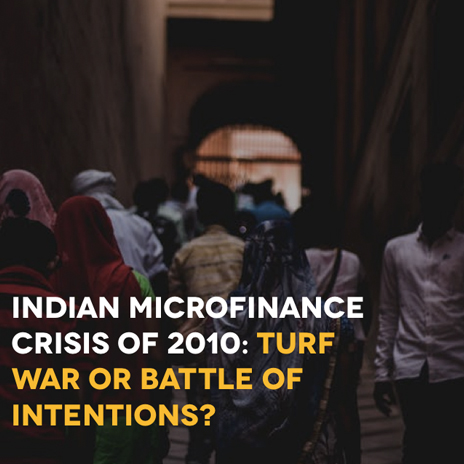
Indian Microfinance Crisis of 2010: Turf War or a Battle of Intentions?
PUBLISHED: October, 2010
Social businesses like microfinance, due to their sensitive client base, need to walk a fine line to balance their
commercial interests with the social and moral expectations of a wide variety of stakeholders. The range of
stakeholders may include the State, investors, and the public at large, besides clients and regulators. Indian
microfinance institutions (MFIs) have done an admirable job of managing the commercial side of their
business; yet they have often struggled to manage the inherent contradictions of running such businesses at
scale while satisfying non-commercial stakeholders, and have often run afoul of the media and the
government. Recent allegations against MFIs by the media and the State include coercive practices, lack of
transparency, and “usurious” interest rates. These accusations have resulted in the passage of an Ordinance
by the State Government of Andhra Pradesh (AP). This white paper by Intellecap, an India-based social
business advisory firm, analyzes the buildup to the crisis in AP, attempts to revisit some fundamentals of the
business, and questions the effectiveness of radical approaches to multiple bottom-line business by the State
and the media.
Reports & Policies
Our Impact Map

Sign up for our newsletter
© Copyright 2018 Intellecap Advisory Services Pvt. Ltd. - All Rights Reserved




